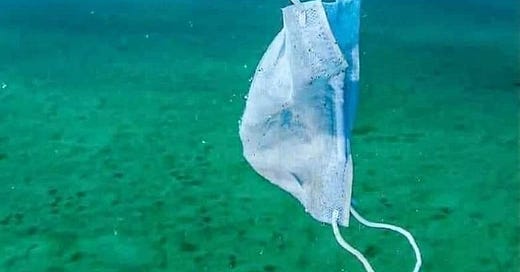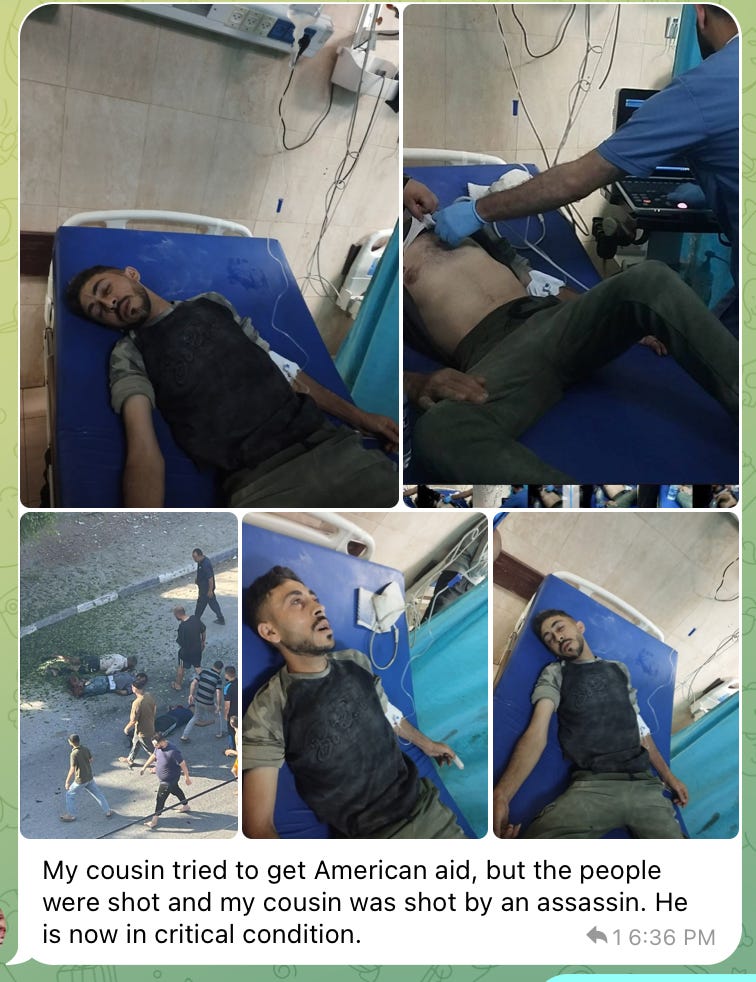The Whole Earth is Our Hospital, but like actually
A proposal that's been growing indoors for a decade, needs air
What would happen if there was a hospital where all caregivers were cared for?
This is a radical proposal to reorganize a hospital using The Hologram.
But first. Very much of what I am describing comes from an urgency that I only began to understand through watching, remotely living and feeling what is happening in Gaza, where there are infinite injuries with no hospitals, and caregivers are fighting for their lives so they can fight for the lives of everyone around them. My friend Mahmoud in Berlin has a cousin in Gaza who was just shot while attempting to get food. There are no hospitals. Can you imagine? We were able to send him 200 euros today, but he will need a bit more to get care and supplies to recover. If you can donate to us today, it would be so useful: https://ko-fi.com/gazafundraiser
Imagining a society with no hospitals has changed my life. Knowing, through my friends like Mahmoud, Ghadir and Ibrahim, what it is like to live with no safe place, no place to get fixed, as the world burns… it is life changing. What is life without hospitals? This is no conceptual art question, it is the question of my life right now.
“The whole earth is our hospital” (Eliot, 1943, Hedva, 2015) but is it? This proposal is to make this poetic statement into a plausible idea that we could practice into existence.
This is a very cursory description of a very big idea that will take a long time. The writing here is more like an image to look at and think with than a plan. If you are a person who works in a medical institution and you would be open to an interview, brainstorm or conversation, I think that this proposal will be in the works for at least a decade before we are able to try it out. So, there is a lot of time to talk, gather ideas, and organize. I would like to speak with people in medical institutions over the next few years as I develop a bit of a science fiction style document of what it would look like to have a hospital where all caregivers are cared for.
I wrote this so anyone can read it without any prior knowledge of The Hologram. But if you have questions about that, a good place to start is http://thehologram.xyz
What is The Hologram?
The Hologram is a non-expert care distribution practice that anyone can use. It is a format for a meeting that produces a network of support where caregivers are cared for. To start, one person (the hologram) asks for support from three people (the triangle). This group of four meet together to ask the hologram questions regularly over time. One person asks social questions, one asks mental/emotional questions, and one asks physical questions. The hologram asks each of their triangle members what kind of support they would like, and when possible, helps them organize their own triangle, and so the network grows.
In this entire process there is curiosity instead of advice, wishes instead of diagnoses, and the person receiving the care is seen as an expert and a teacher. These meetings might happen every season or every month. The care produced in this ritual is good, dialogic, deep and it usually produces energy for all involved.
Do hospitals produce care?
Anyone who has received a surgery has realized that a hospital is a laboratory, a test center, a mechanic, a factory, but not really a place that primarily generates care. However, the place is run by caregivers.
How could a hospital produce care at the scale that it also produces research, money, human longevity and power differentials? Here's a leap: If the caregivers who work at the hospital received high quality long term care and attention that they could trust without feeling like it takes away from the work of the hospital, the attention and care they generate at the hospital would change. The doctors might need more space for care and dialogue. The hospital might need to adapt to host the time and space for care. The implications are many layered, unknown, yet to be imagined. A caring hospital is unknown because a cared for person is also a total fucking mystery to us.
Who are the caregivers at the hospital?
Is a nurse a caregiver?
Are the people who change beds, caregivers?
Are the people at the reception desk, caregivers?
Are the people who do surgeries, caregivers?
Are the people in the billing department, caregivers?
Yes. Each of these caregivers would have three people who meet with them regularly and ask them questions using the format of The Hologram. The time they spend receiving care, using The Hologram protocol, would be paid hours (to train the caregivers to recognize and value the labor of receiving care). The triangle members would not be compensated for their time doing The Hologram.
Who would care for the caregivers?
The caregivers in the hospital would each invite three people to support them regularly over time. The caregivers could invite friends or acquaintances to be their triangle members. Additionally, a pool of willing non-experts could be organized for the caregivers to choose from if they can't organize among people they know. The people who care for the caregivers are people whose primary work is outside the hospital, preferably outside of traditional professional care work (including doctor, nurse, therapist, social worker).
Because the people that look after the professional caregivers in the hospital would come from outside of the hospital, the hospital would begin to grow a network of support that expands beyond the physical, hierarchical and financial walls of the hospital. This would mean that professional caregivers would experience what it means to receive formal non expert care, the most popular care on earth, from mothers, drivers, engineers, masseuses, teachers, gamers, car mechanics, dog walkers, secretaries, firefighters, waiters, and more.
Each of the people in the triangles would also need care, from three other people. In this way, the practice of receiving care would spread like a viral medical school with no administration or bureaucracy. In the diagrams below, imagine that the hospital is what exists above ground and is maintained through a root system of care that is below. In order for the hospital to flourish, there is a huge network of support for the caregivers underground. And all of those supporters have support.
The most popular care on earth, which is also our hospital
The doctor who does your surgery is a man, and he has a family. He has never cried in front of anybody except his mother and his wife. One day, after months of deliberation and fear, he tries The Hologram. Three people he knows (one guy from his bowling club, a new friend who is a librarian, and his cousin) arrive at his house. They spend two hours eating snacks and talking. He tells them how he is feeling and what he would like to talk about. He shares things about his life, his work, and the state of the world. Is this enough, he wonders? His triangle asks him questions about what he shared for about 45 minutes. He is surprised at how deep, but also how light, the conversation feels. He shared more than he expected to. Towards the end of the hang out, the triangle share their reflections (how they feel) and give him feedback (wishes, provocations, and patterns). The day after this strange meeting he has something called a vulnerability hangover, but he doesn't know that word. His teenage daughter notices that he seems a bit lighter, but he also seems a bit close to tears. He doesn't know how to carry himself but he notices that all jokes are a bit funnier. He feels a bit more like a member of the species than usual. How weird.
This meeting happens every month, and after a year, he cries in a hologram meeting. He feels so indebted for receiving a kind of care he never knew to want. He never knew this was possible. But he isn't sure what he can do for the triangle members, though they seem happy to show up for him. Should he buy them nice liquor? A gift certificate to a spa? No. He eventually realizes he wants to ask them if they would like to experience the same thing, with other people. But is this enough?
It takes a year for him to organize the holograms for his triangle members. It feels like forever, and he feels guilty. It leads to some weird communication conflicts. He's not used to having conflicts with his friends, because his friends never really mattered to him before. But these friends who have seen him cry are important to him. He feels like he needs them, which is new and weird. He wants to make sure they know that, but it is tricky to say it without seeming like a sappy dog. Where is his dignity these days anyway?
At work, sometimes the doctor thinks about how he feels in his hologram, and it makes him wonder about how he treats his patients. He never really asks them questions about themselves. It's not his job. He's just meant to cut them open and fix them up. He is all in all, a technician. The patients are just bodies on a factory floor, and he is a mechanic. But he starts to wonder about the lives being lived with these bodies. He begins to wonder how he appears to them. Do they see him as a dimensional being, or just someone who is going to save their life? Are they afraid of him? Does he like that? What would it mean for him to see each person as a multi-dimensional person, and does he have time for that?
What would change in a hospital where there are non professionals taking care of the professional caregivers?
The people who are core to the hospital could become the beginning of a root system of care. The hospital becomes a social body that cannot be contained, as the ecosystem of the care for the hospital would expand beyond its walls. The hospital could become the social center for a town or community. Producing, maintaining and preserving life could be the center of the community's work rather than the thing on the edge of town, and we could do that through organized acts of care and attention instead of money.
Doctors might see patients differently, in fact they might see them. They might want more for them than pharmaceuticals and quick fixes. Patients might begin to question the authority of doctors, and feel more power and autonomy to ask for what they need and to get help to set it up. The people who do all the invisibilized work to keep the hospital going. For instance the cleaners might organize to get their needs met financially and socially, after they use The Hologram for a while to feel seen, supported, and sense their own power.





